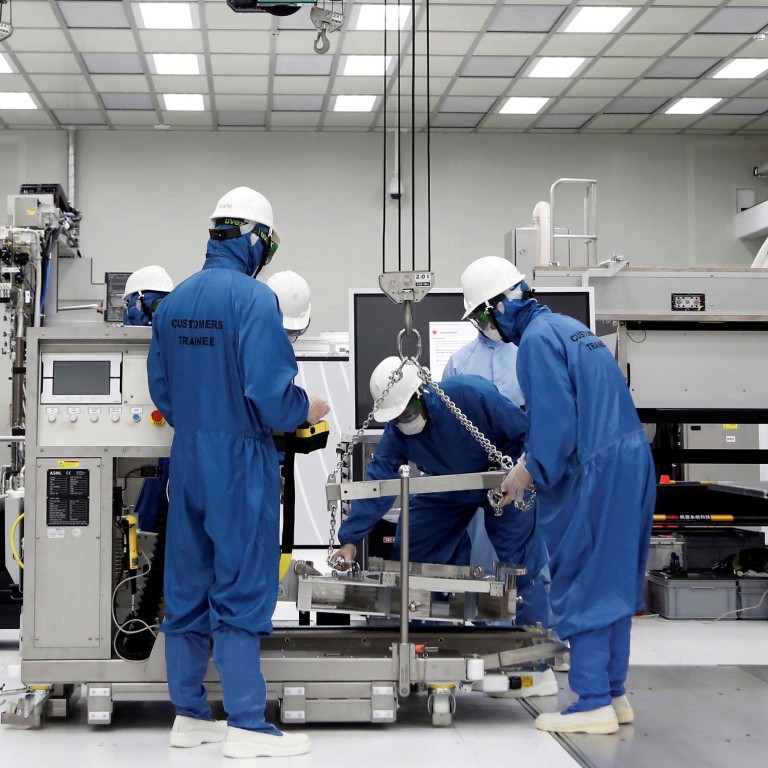
SMIC supplier agrees to buy used ASML lithography system amid China’s national chip drive
- Suzhou-based chemical supplier has agreed to pay just over US$11 million to buy the Dutch-made lithography machine from an East Asia company via Singtest
- China relies exclusively on imports for high-end photoresist materials used in semiconductor manufacturing
A Chinese chemical supplier for the microelectronics industry has said it has agreed to buy a used lithography system from an East Asian company as part of a project to speed up development of high-end photoresist materials for advanced semiconductor production amid an ongoing national drive for self-sufficiency in the sector.
Suzhou Crystal Clear Chemical, based in an industrial estate on the outskirts of Shanghai, said in an updated stock filing on Friday (October 9) that it has agreed to pay US$11.02 million to buy the Dutch-made machine from an East Asian company, via Singtest Technology a Singapore-based specialist in industrial machinery for the semiconductor sector.
In a separate filing last month, the company said it would raise 550 million yuan (US$80.7 million) in convertible bonds to fund a photoresist material project aimed at reducing China’s reliance on foreign supplies amid a “complicated geopolitical environment”.
The Shenzhen-listed company, which counts Semiconductor Manufacturing International Corporation (SMIC), ChangXin Memory Technologies and Hua Hong Semiconductor as its local customers, produces ultra-pure materials used in the microelectronics industry, according to its filing.
“The purchase could help in developing high-end photoresist materials,” Suzhou Crystal Clear Chemical said in the filing, adding that it was important for China to be self-reliant in the critical semiconductor materials currently monopolised by firms from the US, Japan and Europe.
Photoresist is a light-sensitive material used in conjunction with laser-based lithography systems to etch circuit patterns on silicon wafers.
China currently produces only 5 per cent of the photoresists it uses in KrF ultraviolet lasers for 8-inch silicon wafers, and relies entirely on imports for more advanced ArF photoresists for 12-inch wafer production, according to the company.
Suzhou Crystal Clear Chemical did not reveal details of the lithography machine it agreed to buy, other than it was originally manufactured by Dutch company ASML, the global leader in lithography. New ASML machines for ArF lithography cost more than US$50 million.
US restrictions could hamper China’s plans for a semiconductor sector
The news comes a time when China is reinvigorating efforts to develop a self-sufficient semiconductor industry after a protracted trade war morphed into a full blown tech war, with Chinese tech companies facing increasing scrutiny and restrictions from the US government.
In the latest example, Shanghai-based SMIC is facing restrictions on its access to US technology over US concerns that its products could be diverted to the Chinese military.

06:22
Three trends shaping China's internet from SCMP's China Internet Report 2020
Although SMIC was not put on a trade blacklist, US suppliers must now apply for a license to ship equipment and materials to the Chinese chip maker. Gu Wenjun, chief analyst at Shanghai-based semiconductor research firm Icwise, said there was the potential risk of SMIC being cut off completely from US technology if the geopolitical situation escalates.
China expert warns against total focus on self-reliance in chips
China relies exclusively on imports for high-end photoresist materials used in semiconductor manufacturing, according to an August note from industry research Forward Institute.
The global photoresist materials market, which includes applications in printed circuit boards, LCDs and semiconductors, is projected to reach US$5.18 billion by 2025, up from US$3 billion in 2016, according to US market research firm BCC Research.
(Corrects October 1 story in the lead and second paragraph to reflect that the purchase of used lithography system is still in progress, it has not been completed.)
(Updates October 1 story to say equipment was bought from Singtest Technologies)

